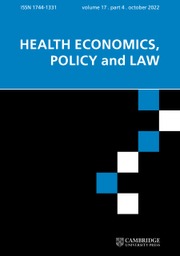Article contents
A game theoretic model of drug launch in India
Published online by Cambridge University Press: 02 December 2005
Abstract
There is a popular belief that drug launch is delayed in developing countries like India because of delayed transfer of technology due to a ‘post-launch’ imitation threat through weak intellectual property rights (IPR). In fact, this belief has been a major reason for the imposition of the Trade Related Intellectual Property Rights regime under the WTO. This construct undermines the fact that in countries like India, with high reverse engineering capabilities, imitation can occur even before the formal technology transfer, and fails to recognize the first mover advantage in pharmaceutical markets. This paper argues that the first mover advantage is important and will vary across therapeutic areas, especially in developing countries with diverse levels of patient enlightenment and quality awareness. We construct a game theoretic model of incomplete information to examine the delay in drug launch in terms of costs and benefits of first move, assumed to be primarily a function of the therapeutic area of the new drug. Our model shows that drug launch will be delayed only for external (infective/communicable) diseases, while drugs for internal, non-communicable diseases (accounting for the overwhelming majority of new drug discovery) will be launched without delay.
- Type
- Articles
- Information
- Copyright
- © 2006 Cambridge University Press
- 4
- Cited by


